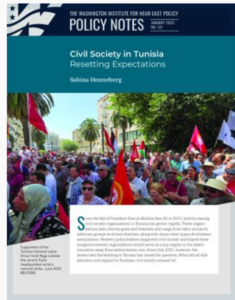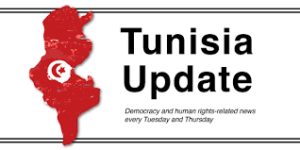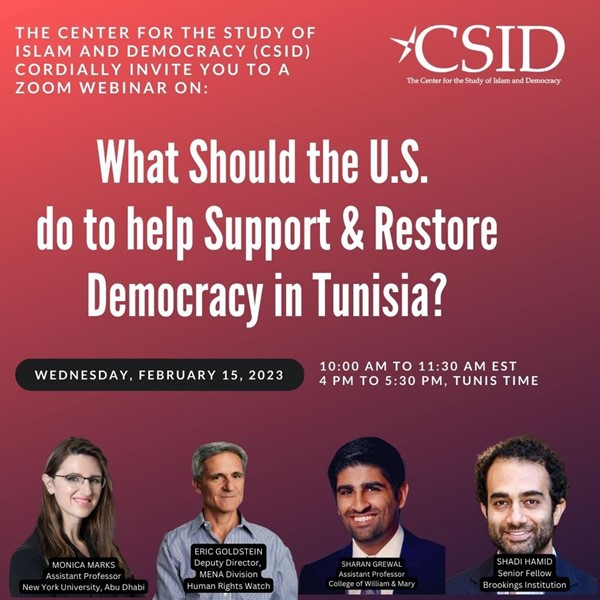UN High Commissioner for Human Rights, Volker Türk, today expressed his concern over the deepening crackdown against perceived political opponents and civil society in Tunisia, including through measures taken by the authorities that continue to undermine the independence of the judiciary.
Tunisian police on Monday ramped up their crackdown on opposition leaders with the arrest of a senior politician and the head of a radio station critical of President Kais Saied, AFP reports:
Noureddine Bhiri, a leading official in the Islamist-inspired Ennahdha party — the largest opposition party in Tunisia — and outspoken critic of Saied, was arrested after police raided his home. The head of the popular radio station Mosaique FM, Noureddine Boutar, was also arrested on Monday following a search of his home.
The arrests come amid a wave of detentions of opposition figures.
 The U.S. government faces a conundrum of whether to double down on aid to Tunisia or curtail it, said Sabina Henneberg, author of a new Washington Institute study, Civil Society in Tunisia: Resetting Expectations. The best approach under the current constraints is a combination of several balanced steps, she told a recent Institute forum (above):
The U.S. government faces a conundrum of whether to double down on aid to Tunisia or curtail it, said Sabina Henneberg, author of a new Washington Institute study, Civil Society in Tunisia: Resetting Expectations. The best approach under the current constraints is a combination of several balanced steps, she told a recent Institute forum (above):
- First, Washington should continue showing solidarity with Tunisian civil society by objecting to new amendments that erode Decree-Law 88.
- Second, it should support anti-corruption reforms that help ease economic hardships and strengthen political life. Saied would be hard-pressed to oppose such reforms given his rhetoric on these issues.
- Third, continuing to fund education could provide a good way of maintaining economic assistance without provoking Saied. Education development programs can help even out the inequalities between Tunisia’s coastal communities and more deprived interior regions.

Credit: POMED
The U.S., Europe, and other donors can support Tunisian civil society by pushing back against legal measures that prevent it from functioning freely (e.g., the erosion of Decree-Law 88/2011; the more recent Cybercrime Decree-Law 54/2022), said Amy Hawthorne, deputy director for research at the Project on Middle East Democracy (POMED). This message should be conveyed clearly through diplomatic channels, avoiding the Biden administration’s previous zigzag approach to events in Tunisia, she told the forum.
Foreign support and economic aid to Tunisia are more important than ever, but they should be provided in a manner that contributes to the five prerequisites for good democratic governance, said Jean-Louis Romanet Perroux, director of the Tunisia-based North African Policy Initiative: namely, a healthy civic political culture; a citizenry with sufficient critical thinking skills; safe and accessible public spaces for activism; mechanisms for popular engagement and state-society dialogue; and broad civic engagement.
Toward that end, Western governments should focus less on funding civil society organizations and more on assisting individuals at the grassroots level, where democratic values are nourished, he added. Civil society organizations can then emerge organically, in tandem with the development of individual values.

What Should the US do to Help Support and Restore Democracy in Tunisia?
The situation for human rights and democratic governance in Tunisia has become alarming and getting worse, by the day, since the coup of July 25, 2021, the Center for the Study of Islam and Democracy (CSID) writes:
- Kais Saied who was elected by 72% of the voters because he promised to “fight corruption” has not only suspended the parliament and the democratic constitution of 2014, he has taken control with the support of the military and the Ministry of Interior of all the institutions and branches of government (executive, legislative, and judicial).
- Despite the fact that his support and popularity has evaporated to less than 10-12% as reflected in the consultation on the constitution (only 5% participated) and the parliamentary elections in December and January (only 11% participated according to “official” results).
- He has also refused to listen to anyone or to dialogue with anyone, including the powerful labor union UGTT, and all the major political forces and parties in the country. The economic situation is in a free fall, and Tunisia could default on its loans within the next 60 days.
What can and what must the U.S. administration, Congress, and the international community do to help support and restore and defend democracy and human rights in Tunisia? CSID invites you to a Zoom Webinar.
SPEAKERS:
MONICA MARKS, Assistant Professor, New York University, Abu Dhabi
ERIC GOLDSTEIN, Deputy Director, MENA Division, Human Rights Watch
SHARAN GREWAL, Assistant Professor, College of William & Mary
SHADI HAMID, Senior Fellow, Brookings Institution
Wednesday, February 15, 2023. 10:00 am to 11:30 am EST. 4 pm to 5:30 pm, Tunis Time.







